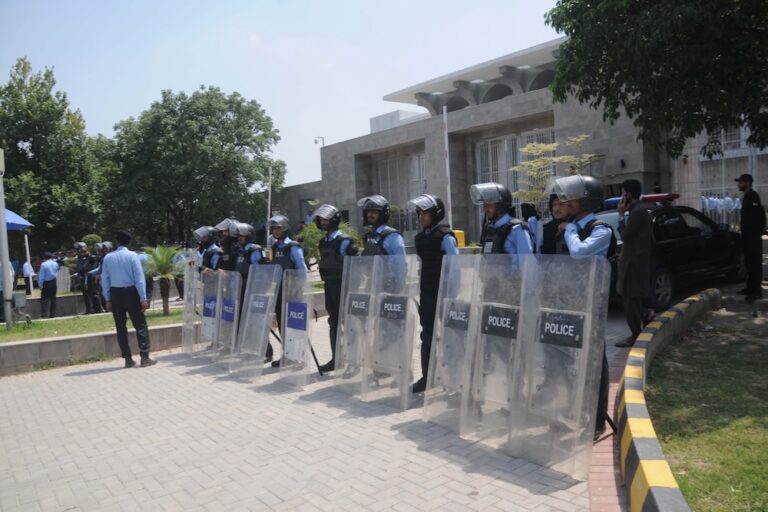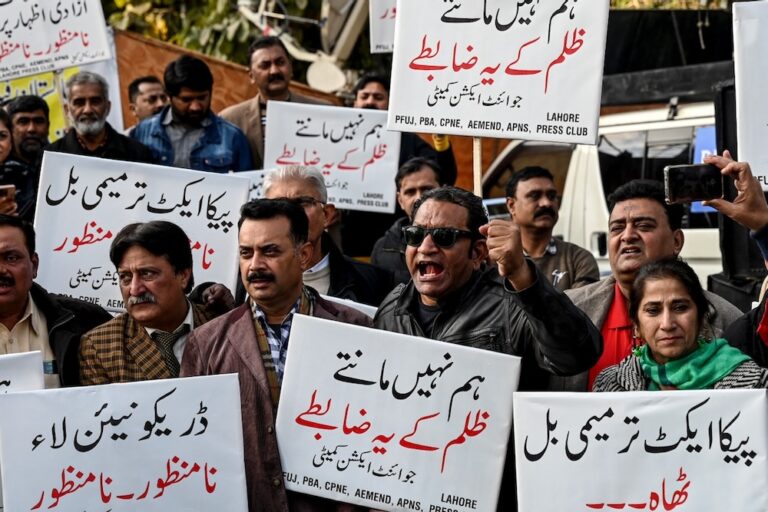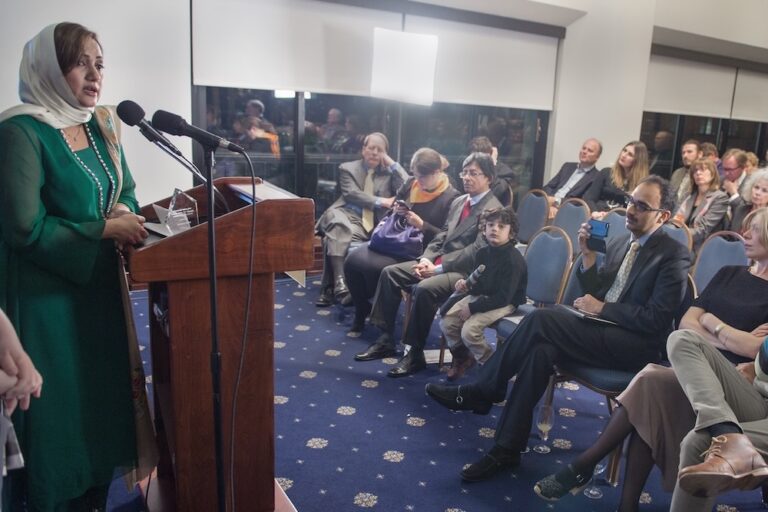(RSF/IFEX) – The following is an abridged version of an RSF press release: Five key problems for media coverage of February’s legislative elections Despite President Pervez Musharraf’s reassuring statements, Pakistan’s media are not free to provide proper coverage of the legislative elections scheduled for 18 February 2008 because of a censorship climate that is sustained […]
(RSF/IFEX) – The following is an abridged version of an RSF press release:
Five key problems for media coverage of February’s legislative elections
Despite President Pervez Musharraf’s reassuring statements, Pakistan’s media are not free to provide proper coverage of the legislative elections scheduled for 18 February 2008 because of a censorship climate that is sustained by the permanent threat of fines, closures of news media outlets and arrests of journalists, Reporters Without Borders said.
The government has introduced a series of regulations that drastically restrict the broadcast media’s ability to cover the election campaign. The ban on Geo News, the freest and most popular of Pakistan’s TV broadcasters, proves that press freedom has not been guaranteed for the polls. At the same time, journalists are exposed to great dangers, with the security forces being responsible for most of the violence.
(. . . )
“The legislative elections will not be free unless the government immediately rescinds the restrictions imposed on the media,” Reporters Without Borders said. “The violence by the police and acts of intimidation by the intelligence services are also unacceptable. It is up to President Musharraf to take concrete measures to ensure that the 18 February elections are free and fair. As things stand, they are not.”
Chief election commissioner Qazi Mohammad Farooq’s promise to “all political parties that the elections will be fair, free and transparent” and information minister Nisar Memon’s statement on 1 January that the government and media must “work as a team” to ensure a favourable climate for the elections are not sufficient.
A broadcast ban was imposed on at least 45 privately-owned satellite TV stations on 3 November 2007 by means of a simple verbal order to cable TV operators. Two privately-owned radio stations were also closed down. Most of these stations are now back on the air, but most of them were forced to drop programmes, sideline journalists or stop carrying foreign programming in order to get permission to resume broadcasting.
The political parties are split on this issue. Farhatullah Babar, the spokesman of Bhutto’s Pakistan People’s Party, said PTV’s coverage of the election was “partisan” but the privately-owned TV stations were doing a good job. He condemned the electoral commission’s failure to ensure that the media are balanced and to prevent them from being pressured. “The government manipulates coverage by means of coercion and intimidation,” he said to Reporters Without Borders.
Tariq Azeem, the spokesman of the Pakistan Muslim League, which supports Musharraf, paid tribute to PTV and said it had given air time to all the candidates. “The privately-owned media cover our activities but they give more time to the opposition parties because there are more of them,” he said, adding, “the government does not manipulate coverage of the elections.”
Zahid Kahn, the spokesman of the Awami National Party (whose strongholds are in the Pashtun areas of Pakistan), said PTV assigned virtually 80 percent of its air time to the government and its supporters while the privately-owned media outlets were afraid of being overly critical. “When we are invited to take part in talk shows, they ask us to be polite because they are under pressure from the authorities.”
“The Pakistani media may appear very lively but it is clear the criticism has been toned down in recent weeks, especially in the editorial sections,” an Islamabad-based diplomat said. “The TV station owners lost lots of money during the November ban,” a TV journalist said on condition of anonymity. “They cannot afford to be banned again, so they censor themselves.” Kashif Abbasi, the host of a TV talk show that was dropped by ARY, was quoted by “The New: York Times” as saying: “News is not being covered objectively, but according to the wishes of the government.”
Before her assassination, Benazir Bhutto was very clear in her condemnation of the government’s attacks on the freedom of the press. During a protest in defence of press freedom in Islamabad on 10 November, Bhutto said: “I have come to demonstrate my solidarity. I reject these restrictions. We believe in free speech. Our war against the dictatorship continues, we are for freedom, we are for the media.”
To read the full pess release, see: http://www.rsf.org/article.php3?id_article=24976


